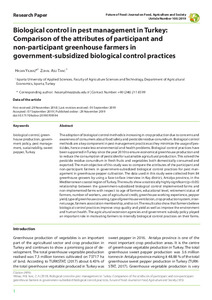| dc.date.accessioned | 2020-01-14T12:52:50Z | |
| dc.date.available | 2020-01-14T12:52:50Z | |
| dc.date.issued | 2019-11-29 | |
| dc.identifier | doi:10.17170/kobra-20190709594 | |
| dc.identifier.uri | http://hdl.handle.net/123456789/11420 | |
| dc.language.iso | eng | |
| dc.publisher | Section Specialized Partnerships in Sustainable Food Systems and Food Sovereignty at the University of Kassel, Germany and Federation of German Scientists (VDW) | |
| dc.rights | Urheberrechtlich geschützt | |
| dc.rights.uri | https://rightsstatements.org/page/InC/1.0/ | |
| dc.subject | biological control | eng |
| dc.subject | greenhouse production | eng |
| dc.subject | government policy | eng |
| dc.subject | pest management | eng |
| dc.subject | sustainability | eng |
| dc.subject | sweet pepper | eng |
| dc.subject | Turkey | eng |
| dc.subject.ddc | 630 | |
| dc.title | Biological control in pest management in Turkey: Comparison of the attributes of participant and non-participant greenhouse farmers in government-subsidized biological control practices | eng |
| dc.type | Aufsatz | |
| dcterms.abstract | The adoption of biological control methods is increasing in crop production due to concerns and awareness of consumers about food safety and pesticide residue conundrum. Biological control methods are a key component in pest management practices as they minimize the usage of pesticides, hence create less environmental and health problems. Biological control practices have been supported in Turkey since the year 2010 to ensure economical greenhouse production and to reduce the consumption of pesticides for sustainable agricultural production. This solved the pesticide residue conundrum in fresh fruits and vegetables both domestically consumed and exported. The main objective of this study was to compare the attributes of the participant and non-participant farmers in government-subsidized biological control practices for pest management in greenhouse pepper cultivation. The data used in this study were collected from 84 greenhouse growers by using a face-to-face interview in Kaş district, Antalya province, in the Mediterranean coastal region of Turkey. The results show a statistically highly significant (p<0.05) relationship between the government-subsidized biological control implemented farms and non-implemented farms with respect to age of farmers, educational level, retirement status of farmers, number of workers, use of agricultural credit, greenhouse working experience, pepper yield, type of greenhouse covering, type of greenhouse ventilation, crop production system, internet usage, farmers association membership, and so on. The results also show that farmers believe biological control practices improve crop quality and yield as well as improve the environment and human health. The agricultural extension agencies and government subsidy policy played an important role in motivating farmers to intensify biological control practices on their farms. | eng |
| dcterms.accessRights | open access | |
| dcterms.creator | Yilmaz, Hasan | |
| dcterms.creator | Tanc, Zuhal Asli | |
| dc.type.version | publishedVersion | |
| dcterms.source.identifier | ISSN 2197-411X | |
| dcterms.source.issue | No 2 | |
| dcterms.source.journal | Future of Food: Journal on Food, Agriculture & Society | eng |
| dcterms.source.pageinfo | Article Number 105 | |
| dcterms.source.volume | Volume 7 | |

